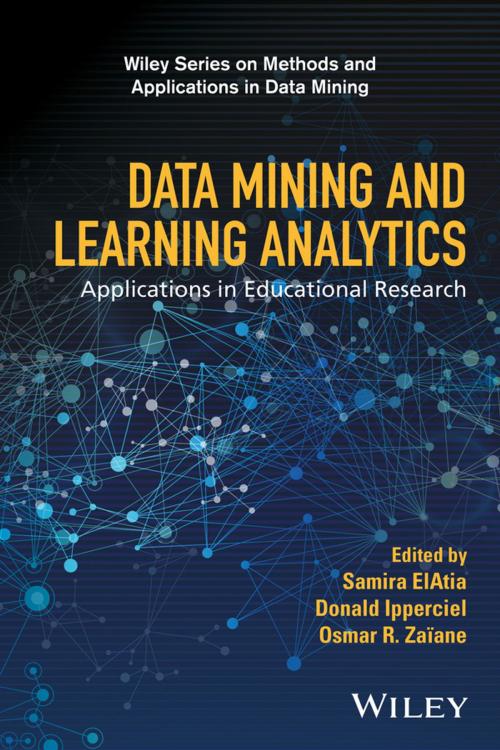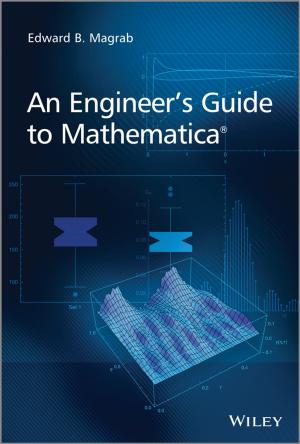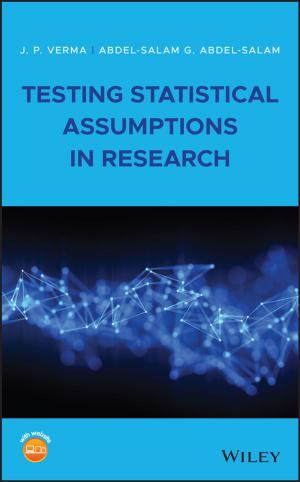Data Mining and Learning Analytics
Applications in Educational Research
Nonfiction, Computers, Database Management| Author: | ISBN: | 9781118998212 | |
| Publisher: | Wiley | Publication: | September 20, 2016 |
| Imprint: | Wiley | Language: | English |
| Author: | |
| ISBN: | 9781118998212 |
| Publisher: | Wiley |
| Publication: | September 20, 2016 |
| Imprint: | Wiley |
| Language: | English |
Addresses the impacts of data mining on education and reviews applications in educational research teaching, and learning
This book discusses the insights, challenges, issues, expectations, and practical implementation of data mining (DM) within educational mandates. Initial series of chapters offer a general overview of DM, Learning Analytics (LA), and data collection models in the context of educational research, while also defining and discussing data mining’s four guiding principles— prediction, clustering, rule association, and outlier detection. The next series of chapters showcase the pedagogical applications of Educational Data Mining (EDM) and feature case studies drawn from Business, Humanities, Health Sciences, Linguistics, and Physical Sciences education that serve to highlight the successes and some of the limitations of data mining research applications in educational settings. The remaining chapters focus exclusively on EDM’s emerging role in helping to advance educational research—from identifying at-risk students and closing socioeconomic gaps in achievement to aiding in teacher evaluation and facilitating peer conferencing. This book features contributions from international experts in a variety of fields.
- Includes case studies where data mining techniques have been effectively applied to advance teaching and learning
- Addresses applications of data mining in educational research, including: social networking and education; policy and legislation in the classroom; and identification of at-risk students
- Explores Massive Open Online Courses (MOOCs) to study the effectiveness of online networks in promoting learning and understanding the communication patterns among users and students
- Features supplementary resources including a primer on foundational aspects of educational mining and learning analytics
Data Mining and Learning Analytics: Applications in Educational Research is written for both scientists in EDM and educators interested in using and integrating DM and LA to improve education and advance educational research.
Addresses the impacts of data mining on education and reviews applications in educational research teaching, and learning
This book discusses the insights, challenges, issues, expectations, and practical implementation of data mining (DM) within educational mandates. Initial series of chapters offer a general overview of DM, Learning Analytics (LA), and data collection models in the context of educational research, while also defining and discussing data mining’s four guiding principles— prediction, clustering, rule association, and outlier detection. The next series of chapters showcase the pedagogical applications of Educational Data Mining (EDM) and feature case studies drawn from Business, Humanities, Health Sciences, Linguistics, and Physical Sciences education that serve to highlight the successes and some of the limitations of data mining research applications in educational settings. The remaining chapters focus exclusively on EDM’s emerging role in helping to advance educational research—from identifying at-risk students and closing socioeconomic gaps in achievement to aiding in teacher evaluation and facilitating peer conferencing. This book features contributions from international experts in a variety of fields.
- Includes case studies where data mining techniques have been effectively applied to advance teaching and learning
- Addresses applications of data mining in educational research, including: social networking and education; policy and legislation in the classroom; and identification of at-risk students
- Explores Massive Open Online Courses (MOOCs) to study the effectiveness of online networks in promoting learning and understanding the communication patterns among users and students
- Features supplementary resources including a primer on foundational aspects of educational mining and learning analytics
Data Mining and Learning Analytics: Applications in Educational Research is written for both scientists in EDM and educators interested in using and integrating DM and LA to improve education and advance educational research.















